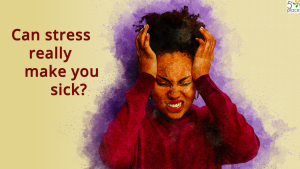Have you ever found yourself battling a cold or migraine after a particularly stressful week? You’re not alone—and it’s not a coincidence. While stress is a normal part of life, chronic, unmanaged stress can take a profound toll on your physical health. As a clinical psychologist specializing in stress and anxiety, I see it every day in my practice: people feeling overwhelmed emotionally who are also struggling physically. In this post, I’ll explain exactly how stress can make you sick, the science behind the stress response, and what you can do to protect your health, body, and mind.
Understanding the Stress Response
Stress isn’t inherently bad. In fact, it’s a critical survival mechanism. When you perceive a threat—whether it’s a car swerving in front of you or an urgent work deadline—your brain triggers the release of stress hormones like adrenaline and cortisol. This “fight-or-flight” response prepares your body to act quickly: your heart races, blood pressure rises, and your senses sharpen.
But this response was designed to be short-lived. When your body remains in this heightened state for days, weeks, or even months, stress shifts from helpful to harmful. Chronic stress means your body is constantly flooded with stress hormones, and that prolonged exposure can disrupt nearly every major system in your body.
How Stress Makes You Physically Sick
1. Weakened Immune System
Chronic stress suppresses immune function, making it harder for your body to fight off viruses and infections. You might notice that you catch colds more often or take longer to recover when you’re feeling overwhelmed.
2. Digestive Disruption
Stress can wreak havoc on your digestive system. It can cause stomach pain, heartburn, and contribute to conditions like irritable bowel syndrome (IBS). In some cases, it may even exacerbate ulcers and other gastrointestinal issues.
3. Cardiovascular Strain
Frequent spikes in blood pressure and heart rate increase your risk of hypertension, heart disease, and stroke. Long-term stress can also lead to inflammation in the blood vessels, a known contributor to cardiovascular problems.
4. Sleep Disturbances
Stress often interferes with sleep, causing insomnia, disrupted sleep patterns, or non-restorative rest. Poor sleep, in turn, impairs your ability to manage stress, setting up a vicious cycle.
5. Skin and Hair Reactions
Ever had a breakout before a big event or noticed hair thinning during a tough time? That’s stress. It can trigger skin conditions like acne, eczema, or hives and lead to hair loss or scalp irritation.
These physical effects are not “all in your head.” They’re real, measurable, and often the first signals that your body is under too much strain.
Mental Health and the Physical Body
Mental and physical health are deeply connected. Stress can contribute to anxiety and depression, which come with their physical symptoms—muscle tension, headaches, fatigue, and digestive trouble. Additionally, chronic stress can worsen pre-existing health conditions, from autoimmune disorders to diabetes. When mental strain goes unchecked, the body inevitably bears the burden.
The Cycle of Stress and Sickness
What’s more, illness itself can become a source of stress, creating a feedback loop. You might feel anxious about missed work, financial burdens, or the fear of not getting better. This ongoing stress can slow down healing and keep your immune system from bouncing back. Recognizing this cycle is essential so you can intervene and regain balance.
What You Can Do About It
The good news? Stress doesn’t have to control your health. There are steps you can take to protect your well-being and build resilience:
-
Practice Mindfulness: Techniques like deep breathing, meditation, and grounding exercises help calm the nervous system.
-
Move Your Body: Regular physical activity reduces stress hormones and boosts mood-regulating chemicals like serotonin.
-
Prioritize Sleep: Maintain a consistent sleep routine and create a restful bedtime environment.
-
Eat for Energy: A balanced diet supports both mental clarity and physical strength.
-
Seek Professional Support: Therapy, including cognitive-behavioral therapy (CBT), can help you identify stressors, change thought patterns, and develop healthy coping strategies.
At the Anxiety and Stress Center in Orland Park, we specialize in helping individuals understand and manage the impacts of stress in their lives. Whether you’re feeling physically run down or emotionally overwhelmed, we’re here to help you heal—inside and out.
Conclusion
Stress isn’t just a mental burden—it’s a full-body experience. Left unchecked, it can make you sick, drain your energy, and rob you of the quality of life you deserve. But you don’t have to suffer in silence. With awareness, practical tools, and professional support, you can manage stress in a healthy way.
Your health is worth protecting—mind, body, and spirit. If you’re ready to feel better, we’re here to help.
Contact the Anxiety and Stress Center in Orland Park today to learn more or schedule an appointment with Dr. Holly Houston or one of our specialists https://anxiety-stresscenter.com.
